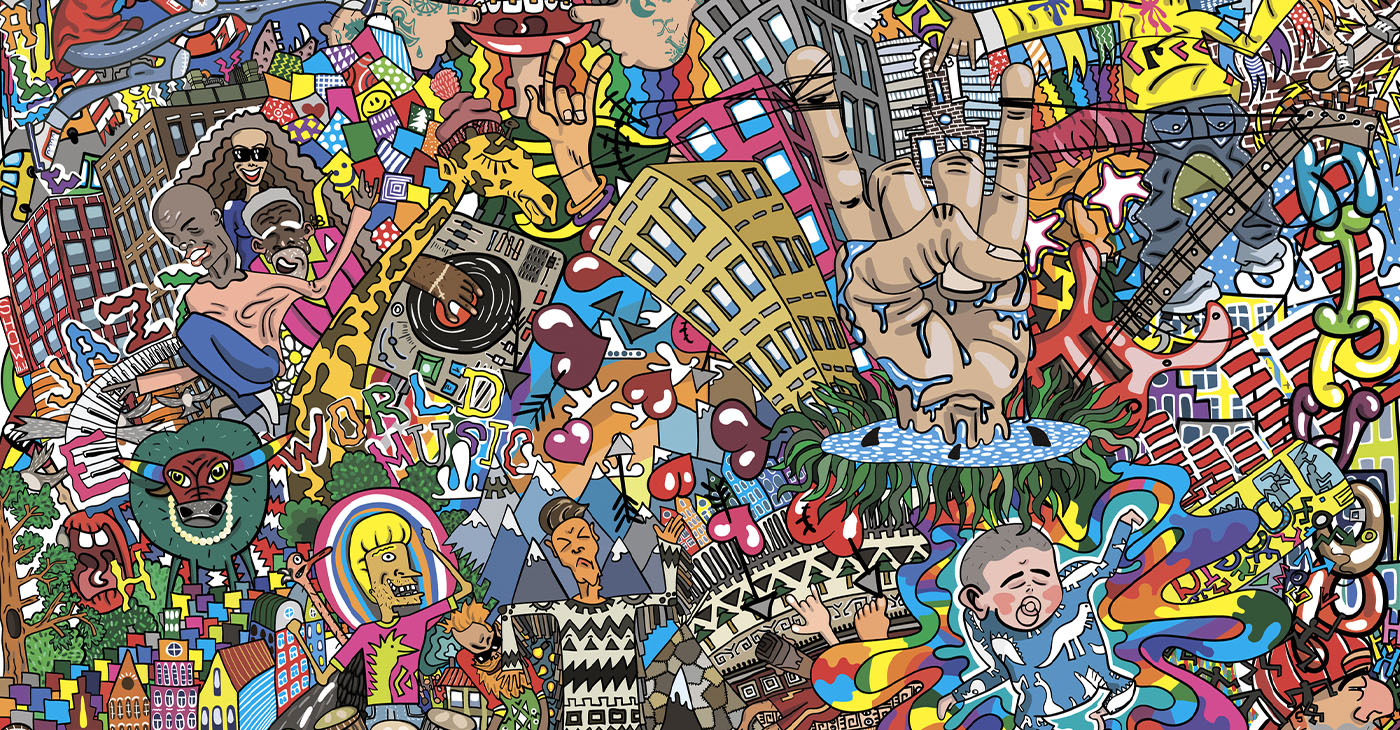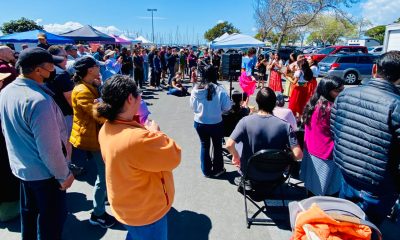Commentary
OPINION: When Trash Becomes Trash: Denunciation of rap, Part 2
A few years ago, Dr. Jeffries spoke at a conference on rap and hip-hop at Purdue University. He noted, “When rap and hip-hop came on the scene, the homicide rate skyrocketed. The language of rap suggests violence, the degrading of the self, and an absence of love. We need to elevate the aesthetics of hip-hop like it once was, to uplift the youth of the Black community.

By Charles Blackwell
Special to The Post
Last week, The Post published Part 1 of a commentary on the effects of rap/hip-hop music on youth. Part 2 is below.
As one African American writer on C-Span said recently, “We no longer have music.”
We agree with that assessment. An agenda of cultural destruction, comprising illegal narcotics, gang violence, and the broadcast of rap (which in effect is violence) has been activated.
It has reached a point in our society where we can no longer separate one from the other.
A few years ago, Dr. Jeffries spoke at a conference on rap and hip-hop at Purdue University. He noted, “When rap and hip-hop came on the scene, the homicide rate skyrocketed. The language of rap suggests violence, the degrading of the self, and an absence of love. We need to elevate the aesthetics of hip-hop like it once was, to uplift the youth of the Black community.
The overuse of the N-word is dehumanizing, making it easier in one’s mind to kill one’s neighbor. One rap group’s message implies that cash rules everything around me except me! There is big cash for Black artists that want to call themselves “n—a” and call other Black people “n—a.”
Many white folks love that mess, and they pay big money to keep it going. This is self-destructive for Black people.
The use of the word “b—h” falls into the same category — to degrade a woman and create a person of worthlessness. It also creates hateful relationships between men and women. These antagonizing words continue to build poor self-esteem, self-hatred, and relationships based on sex without love.
Many of us are aware of producers, agents, and recording companies meeting behind closed doors designing destructive rap with the potential to destroy Black communities that parallel actions by city officials, real estate companies and politicians when they drew up plans to implement policies of restricted covenants which was actually, segregated housing.
Power brokers have collected artists, influencing them to sign their souls away and produce obscene, destructive material. Cha-ching! All of this falls in line with the government’s drug plan in Black communities which journalist Gary Webb presented during the 1990s. It was clearly an act of genocide, and so is this new rap.
The “blanger” or Black anger in rap continues to proliferate in the minds and emotions of our youth. It is, plain and simple, the glorification of our own self destruction. We are being crushed by white racism on the one hand and Black self-hate on the other.
We have so many issues facing us as a community that we really need all hands on deck. We need hip-hop to step up and help us address these issues and thus attempt to eradicate what we can.
We can party and still help our children improve their reading scores, right?
According to the National Assessment of Education Progress, 56% of Black 4th graders did not meet their reading benchmarks and 48% of our Black 8th graders did not meet their reading benchmarks.
Hip-hop needs to move from boys to men because we need that maturity, we need that accountability, we need leadership and inspiration from the young to improve as a community.
Rapping about killing other Black men, chopping them up and stuffing them in the trunk of your car is an extreme form of self-hatred.
America will consume your internalized racism ‘til the fat lady sings, “until the trees and seas just up and fly away, until the day that eight times eight times eight is four” (Stevie Wonder). Why help them in our own destruction?
It is time for us, if we intend to exist as a people, to take a stand against this destructive disease. We must stop our children from being a part of it, get churches to speak out against it, and not allow it to be presented at community events.
At this point in time, we who stand on the shoulders of our ancestors are not here to debate the right to free speech.
Rather, we are here to push for the continued existence of Black people instead of our calculated annihilation. We must be that man in the mirror and take a pause for the cause and check ourselves before we continue and continue and continue wrecking ourselves.
Make it make sense.
Besides myself, this concerned community includes: Warren Goodson, Artist North Carolina; Vincent Kobelt, poet writer, Sacramento; Safell Gardner, sculptor, Detroit; Stephen Monroe, poet/journalist, Washington D.C.; Arlene Goodson, poet, New York City; Alan Laird, artist/writer, Florida; Sylvester Guard, artist-poet, San Francisco; Bisola Marignay, poet writer, Oakland; Napoleon Henderson, artist with Afrocobra, Boston.
Activism
Oakland Post: Week of April 24 – 30, 2024
The printed Weekly Edition of the Oakland Post: Week of April 24 – 30, 2024

To enlarge your view of this issue, use the slider, magnifying glass icon or full page icon in the lower right corner of the browser window. ![]()
Activism
Oakland Post: Week of April 17 – 23, 2024
The printed Weekly Edition of the Oakland Post: Week of April 17 – 23, 2024

To enlarge your view of this issue, use the slider, magnifying glass icon or full page icon in the lower right corner of the browser window. ![]()
Commentary
Opinion: Surviving the Earthquake, an Eclipse and “Emil Amok.”
Last Friday, a 4.8 magnitude earthquake shook New York City, reported as the “biggest earthquake with an epicenter in the NYC area since 1884” when a 5.2 quake hit. A bit bigger. The last quake similar to Friday’s was a 4.9 in 1783.Alexander Hamilton felt it — 241 years ago. That’s why New Yorkers were freaking out on Friday. They were in the room where it happens.

By Emil Guillermo
I’m a Northern Californian in New York City for the next few weeks, doing my one-man show, “Emil Amok, Lost NPR Host, Wiley Filipino, Vegan Transdad.”
I must like performing in the wake of Mother Nature.
Last Friday, a 4.8 magnitude earthquake shook New York City, reported as the “biggest earthquake with an epicenter in the NYC area since 1884” when a 5.2 quake hit. A bit bigger. The last quake similar to Friday’s was a 4.9 in 1783.
Alexander Hamilton felt it — 241 years ago.
That’s why New Yorkers were freaking out on Friday. They were in the room where it happens.
And it just doesn’t happen that often.
Beyonce singing country music happens more frequently.
When I felt New York shake last week, it reminded me of a time in a San Francisco TV newsroom when editors fretted about a lack of news an hour before showtime.
Then the office carpeting moved for a good ten seconds, and the news gods gave us our lead story.
On Friday when it happened in NYC, I noticed the lines in the carpeting in my room wiggling. But I thought it was from a raucous hotel worker vacuuming nearby.
I didn’t even think earthquake. In New York?
I just went about my business as if nothing had happened. After living near fault lines all my life, I was taking things for granted.
Considering the age of structures in New York, I should have been even more concerned about falling objects inside (shelves, stuff on walls) and outside buildings (signs, scaffolding), fire hazards from possible gas leaks, and then I should have looked for others on my floor and in the hotel lobby to confirm or aid or tell stories.
Of course, as a Californian who has lived through and covered quakes in the 4 to 6 magnitude range, I tried to calm down any traumatized New Yorker I encountered by taking full responsibility for bringing in the quake from the Bay Area.
I reassured them things would be all right, and then let them know that 4.8s are nothing.
And then I invited them to my consoling post-Earthquake performance of “Emil Amok, Lost NPR Host…”
It was the night of the eclipse.
ECLIPSING THE ECLIPSE
In New York City, the eclipse was about 90 percent visible. Good enough for me. Though a full solar eclipse is a celestial rarity, blockages of any sort aren’t generally celebrated. My one-man play is about growing up with the eclipsed history of American Filipinos and how I struggle to unblock all that.
For example, did you know the first Filipinos actually arrived to what is now California in 1587? That’s 33 years before the Pilgrims arrived in America on the other coast, but few know the Filipino history which has been totally eclipsed.
I was in Battery Park sitting on a bench and there was a sense of community as people all came to look up. A young woman sitting next to me had a filter for a cell phone camera. We began talking and she let me use it. That filter enabled me to take a picture of the main event with my iPhone.
For helping me see, I invited her and her boyfriend to come see my show.
Coincidentally, she was from Plymouth, Massachusetts, near the rock that says the year the Pilgrims landed in 1620.
In my show she learned the truth. The Pilgrims were second.
History unblocked. But it took a solar eclipse.
Next one in 2044? We have a lot more unblocking to do.
If you’re in New York come see my show, Sat. April 13th, 5:20 pm Eastern; Fri. April 19, 8:10 pm Eastern; and Sun. April 21st 5:20 pm Eastern.
You can also livestream the show. Get tickets at www.amok.com/tickets
About the Author
Emil Guillermo is a journalist and commentator. He does a mini-talk show on YouTube.com/@emilamok1. He wishes all his readers a Happy Easter!
-

 Activism4 weeks ago
Activism4 weeks agoOakland Post: Week of March 27 – April 2, 2024
-

 #NNPA BlackPress4 weeks ago
#NNPA BlackPress4 weeks agoBeloved Actor and Activist Louis Cameron Gossett Jr. Dies at 87
-

 Community1 week ago
Community1 week agoFinancial Assistance Bill for Descendants of Enslaved Persons to Help Them Purchase, Own, or Maintain a Home
-

 Activism3 weeks ago
Activism3 weeks agoOakland Post: Week of April 3 – 6, 2024
-

 Business2 weeks ago
Business2 weeks agoV.P. Kamala Harris: Americans With Criminal Records Will Soon Be Eligible for SBA Loans
-

 Activism2 weeks ago
Activism2 weeks agoOakland Post: Week of April 10 – 16, 2024
-

 Community2 weeks ago
Community2 weeks agoAG Bonta Says Oakland School Leaders Should Comply with State Laws to Avoid ‘Disparate Harm’ When Closing or Merging Schools
-

 Community1 week ago
Community1 week agoOakland WNBA Player to be Inducted Into Hall of Fame





















































